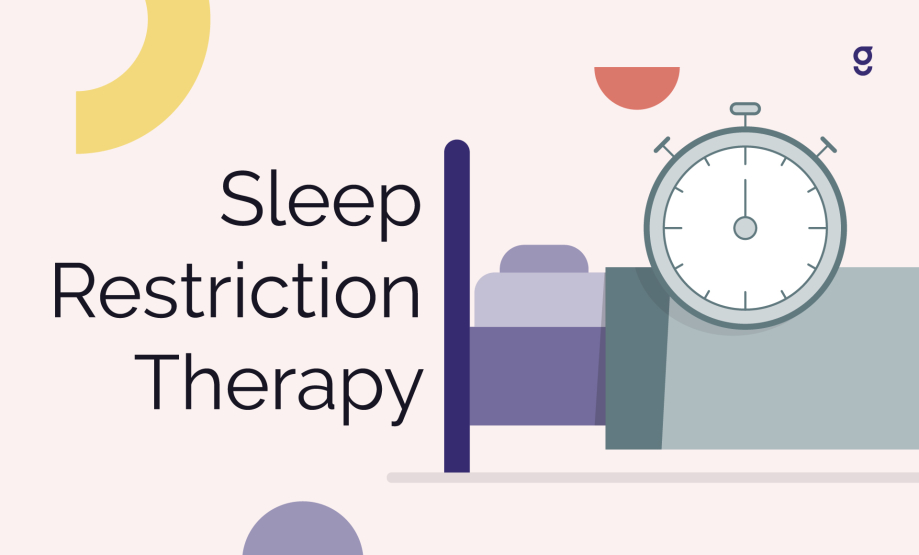How Does Sleep Restriction Therapy (SRT) Work?
Contents:
What Is Sleep Restriction Therapy?
How Does Sleep Restriction Therapy Work?
What Are The Steps In Sleep Restriction Therapy?
What Are Some Sleep Restriction Therapy Hints?
How Long Does It Take For Sleep Restriction Therapy To Work?
How Effective is Sleep Restriction Therapy?
Goodpath’s Cognitive Behavioral Therapy for Insomnia (CBT-I) Program
What Is Sleep Restriction Therapy?
Sleep Restriction Therapy (SRT) is a behavioral treatment for long-term (chronic) insomnia. With SRT, a person’s time in bed (TIB) is limited to the time they’re sleeping (note: TIB should not be less than 5 hours). That person will gradually increase their TIB as their sleep improves until they meet their required amount of sleep.
SRT can be an effective treatment in the short term and may be offered as a single therapy. However, it is often part of multi-component treatment, like cognitive behavioral therapy for insomnia (CBT-I). CBT-I, recommended as the first-line therapy for chronic insomnia, includes SRT, as well as stimulus control, relaxation training, and etc.
How Does Sleep Restriction Therapy Work?
Limiting time in bed can shorten the time it takes to fall asleep and improve the quality of sleep by:
Building homeostatic sleep drive - the drive to sleep increases, the longer a person is awake
Balancing circadian control of the sleep-wake cycle - aligning the body’s 24-hour clock with alert and sleepy sensations
Decreasing hyperarousal -both mind and body arousal, before sleep
What Are The Steps In Sleep Restriction Therapy?
The steps of SRT may vary from one program to another, however, there are some common parts. They include:
Sleep diary/average total sleep time. Before starting sleep restriction, your coach will recommend that you use a sleep diary to record your total sleep time each night for a period of 1 to 2 weeks. This is used to calculate the average total sleep time per week.
Sleep window. To start, your coach will recommend that you restrict the time in bed each night to equal your average total sleep time. This is also called the sleep window. For example, a person averaging 6 hours of sleep/night should restrict their time in bed to 6 hours.
Sleep efficiency score. Continuing to use the sleep diary to track time in bed and time asleep allows your coach to calculate your sleep efficiency score: the time spent asleep, in minutes, divided by time in bed, in minutes.
Average sleep efficiency score. Every week, this information is used to determine the average sleep efficiency score - percentage of time asleep while in bed over one week’s time.
Adjust sleep window. Your coach may adjust the sleep window based on average sleep efficiency scores.
Your sleep diary will also help you and your coach to track your progress as sleep improves and core sleep requirements (the minimal amount of sleep the brain and body need to recover) are determined.
What Are Some Helpful Hints For Sleep Restriction Therapy?
Caution! Early in SRT treatment, a person may have an increase in daytime sleepiness.
If this occurs, do not drive or operate machinery.
Expect an increase in daytime sleepiness. The sleepiness will improve as your sleep becomes more regular and of higher quality (i.e. more efficient).
It’s best to wake up and go to sleep at around the same time. Use average total sleep time to determine both. For example, a person with an average total sleep time of 6 hours who wishes to have a wake time of 6:00 AM should go to sleep at 12:00 AM - allowing for 6 hours of sleep.
Avoid napping.
Practice good sleep hygiene.
How Long Does It Take For Sleep Restriction Therapy To Work?
Although we know SRT works (see next section), we don’t have a precise timeframe for how long it takes for most people. From an analysis of several studies of SRT, we know that programs can last from two to eight weeks. Follow-up assessments to determine program effectiveness were not completed until two to twelve weeks after the programs ended.
SRT isn’t a quick fix. It may take several weeks until you see the positive effects. The time involved is typically as follows:
First, you will use a sleep diary for one to two weeks to record information about your sleep.
Using that data, you’ll begin the SRT steps (initially, it’s common to be even more sleepy from reducing your time in bed).
You will slowly lengthen your sleep time.
Be patient and carefully follow all of the steps!
How Effective is Sleep Restriction Therapy?
SRT can be an effective short-term treatment for chronic insomnia. It lessens a person’s time in bed or “opportunity to sleep,” thus increasing sleep drive, improving sleep-wake balance, and decreasing pre-sleep arousal.
SRT is a critical part of cognitive behavioral therapy for insomnia (CBT-I) - so much so that more than 3 out of 4 people who participate in digital CBT-I achieve healthier sleep.
Goodpath’s Cognitive Behavioral Therapy for Insomnia (CBT-I) Program
Goodpath offers SRT as part of our cognitive behavioral therapy for insomnia (CBT-I) program, although it may be a stand-alone treatment in other settings. It is introduced in one of the early sessions of our multi-week CBT-I program and supported by our health coaches.
If you have trouble sleeping, sleep restriction therapy is just part of our sleep program. Our well-rounded sleep program also includes supplements, devices, mind-body techniques, and nutritional support. To get started, complete our brief sleep assessment.
Related article:
When to See a Doctor for Insomnia Mental Health Therapy Settings
